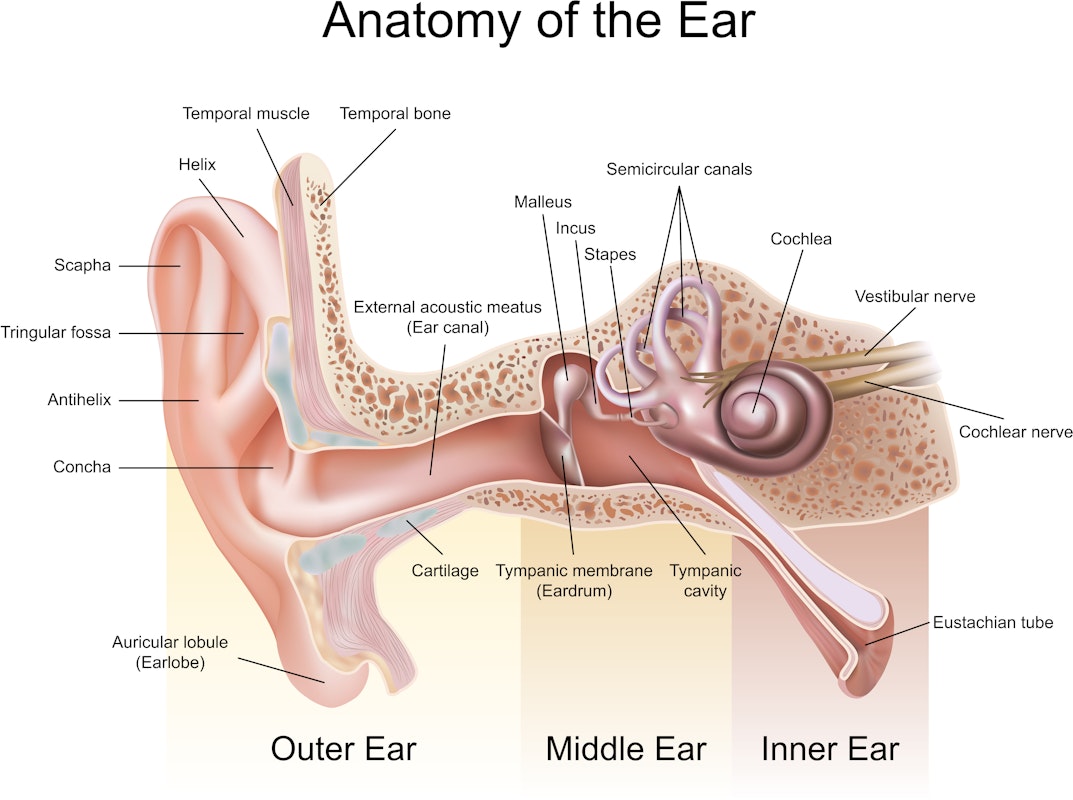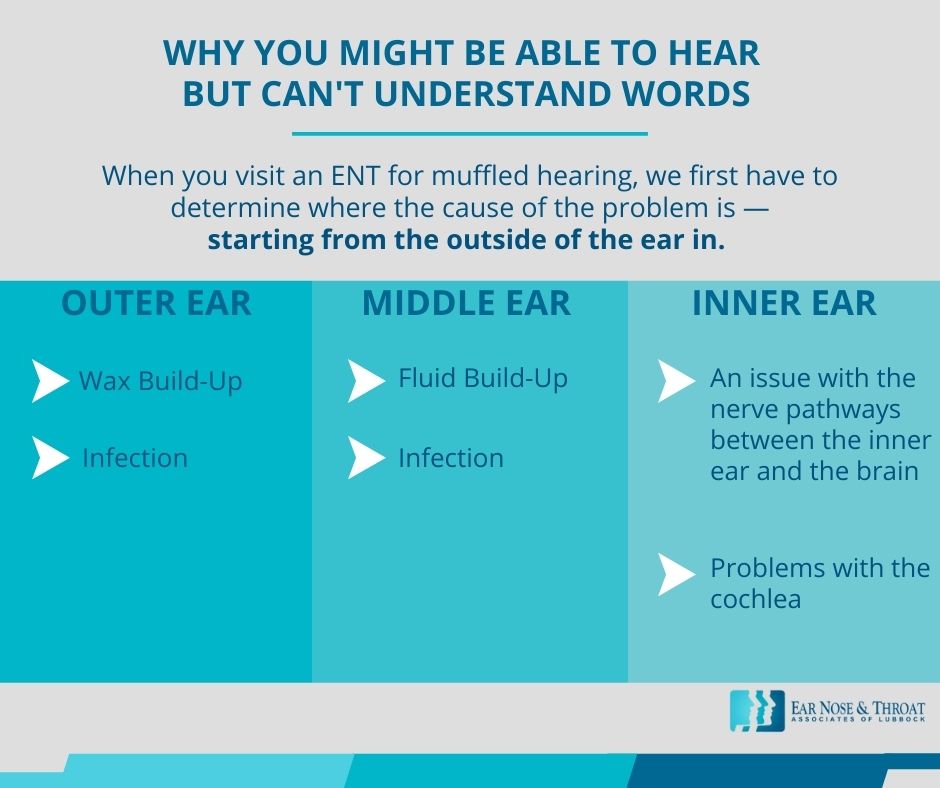Can You Hear But Can’t Understand Words? Here’s What To Do

Some people are born with hearing deficits. Others develop hearing loss slowly over time, and still others lose their hearing rapidly.
When you can hear, but you can’t understand words, you may feel like the world is muffled. Maybe you can understand words in a quiet environment, but have a hard time understanding them in a noisy environment, like a crowded restaurant. Or maybe it’s difficult all the time.
Whatever your case is, keep reading to learn more about why you can hear but can’t understand words, and what you can do about it.
Anatomy of the Ear
To better understand hearing loss, let’s look briefly at the anatomy of the ear. Hearing loss can come from problems with the outer, middle, or inner ear.
- The outer ear includes everything that we visually see as “the ear,” plus the ear canal that leads to the eardrum, the thin barrier between the outer and middle ear.
- The middle ear is on the other side of the eardrum and contains three of the smallest bones in the body: the malleus, incus, and stapes (colloquially known as the hammer, the anvil, and the stirrup).
- The inner ear contains the cochlea, which transforms sound vibrations into nerve impulses to send to your brain. It is also contains semicircular canals that help you keep your balance.

When You Can Hear But Can’t Understand Words
Whether the onset of your hearing loss was sudden or gradual, it can be disorienting and disconcerting.
When you visit an ENT for muffled hearing, we first have to determine where the cause of the problem is. Starting from the outside in, here are a few of the most likely causes of being able to hear but not understand words, and the treatments for each.
Problems With the Outer Ear
Did you know that ear wax can actually interfere with hearing? Normally, ear wax makes its way out of the ear through natural processes, but sometimes it can become stuck in the ear. This can happen because of structural abnormalities, Q-Tip usage, and other causes.
When the outer ear becomes impacted with wax, that wax blocks sound waves from reaching your eardrum and muffles your hearing. Your ENT doctor or audiologist can help clean the wax out of your ear, which usually improves hearing right away.
Other times, the outer ear can become infected and affect hearing. An outer ear infection, commonly known as swimmer’s ear, is very painful. Swimmer’s ear affects the skin in the auditory canal, causing it to redden, ache, and swell, sometimes severely. You may also experience drainage from the ear. It’s this drainage that usually causes muffled hearing.
Fortunately, swimmer’s ear is fairly easy to treat with antibiotic drops. Oral antibiotics can also be used for especially severe cases.
Problems With the Middle Ear
Fluid buildup or an infection in the middle ear (otitis media) can cause muffled hearing. Symptoms may include a feeling of pressure or fullness behind the eardrum. If this pressure continues to build, the eardrum could even rupture.
Your ENT doctor can diagnose fluid or an infection in the middle ear with an exam. Most ear infections are viral, though, and will resolve in a few days on their own. A bacterial infection can be treated with antibiotics. In the meantime, decreasing inflammation by using decongestants may help facilitate draining of the middle ear and restore normal hearing.
If the fluid in the middle ear won’t drain or keeps coming back, the best method of relief is a tympanostomy.
Fluid buildup in the middle ear is extremely common in young children, but adults can experience it as well.
Problems With the Inner Ear
Sensorineural hearing loss (SNHL) is the most common type of hearing loss. SNHL results from a problem in the inner ear from one of two causes:
- An issue with the nerve pathways between the inner ear and the brain.
- Problems with the cochlea, a fluid-filled, snail-shaped bone in the inner ear.
SNHL can be caused by head trauma, repeated exposure to loud noises, genetic hearing loss, aging, and certain medications that damage hearing (such as particular cancer drugs and a class of antibiotics called aminoglycosides).
Diagnosing problems in the inner ear requires a test called an audiogram. An audiogram tests your ability to hear noises at various frequencies. People with SNHL usually find it particularly difficult to hear soft sounds, but louder sounds may also be muffled.
This can explain why someone with SNHL might be able to hear, but have trouble understanding people’s words or hear distorted words — especially in a noisy setting.
Hearing aids can be extremely helpful for people with SNHL. People who still have a good understanding of words often have an easier time with hearing aids, but that doesn’t mean they can’t help make words sound clearer as well. Assistive listening devices can be useful as well, though they’re most often used in classroom settings.

Your Next Steps
If you can hear but can’t understand people’s words, schedule a consultation with your ENT doctor and/or audiologist. They can check for problems with your outer and middle ear. An audiologist will perform an audiogram to determine if you have SNHL and whether hearing aids could be helpful to you.
If your audiologist determines that hearing aids could be helpful, they will generally recommend a 30-day trial to make sure the hearing aids are the best possible fit.
These days, you can purchase hearing aids online, at Costco, or sometimes directly through your insurance company. These can be an acceptable option in cases of mild hearing loss, but programming, service, and repair options are extremely limited.
People with more severe hearing loss and hearing loss involving difficulty in understanding words may want to get their hearing aids from their doctor or audiologist’s office. In these cases, it’s beneficial to have a board-certified audiologist who can program your hearing aids to your individualized hearing loss and who you can easily return to if adjustments need to be made.
Dr. Scolaro is a board-certified Otolaryngologist servicing the South Plains area. He has been practicing in Lubbock since 1990 and has earned a reputation as a skilled and experienced surgeon. He currently serves as the Medical Director for Covenant High Plains Surgery Center campuses, is a member of Covenant Health Partners and is an adjunct faculty professor for Texas Tech University Health Sciences Center School of Medicine. Learn more about Dr. Scolaro.
Categories:








